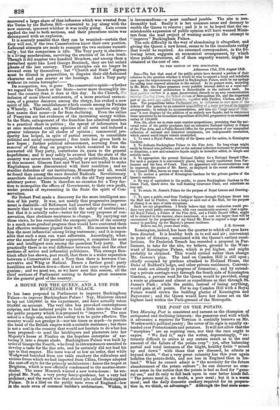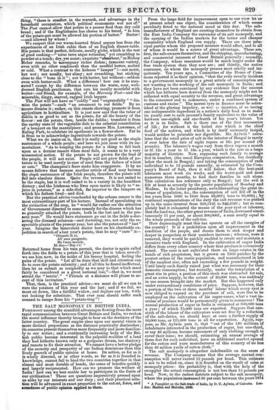THE POST ON THE POTATO.
THE Morning Post is consistent and earnest as the champion of antiquated and declining interests : the generous zeal with which it advocates a reprieve for Toryism it cordially bestows on Mr. Wordsworth's political poetry ; the cover of its aegis is equally ex- tended over Protectionists and potatoes. It will not allow thatthe " murphies " are an expiring race, nor that the race ought to expire. " We find it,' says the writer, deprecatingly, " ex- tremely difficult to arrive at any certain result as to the real amount of the failure of the potato crop": yet, after balancing partial and total instances of the blight, healthy fields " mixed up and down" with those that are diseased, he admits as beyond doubt, " that a very great calamity has this year again befallen the potato-fields, and not less in England than in Ire- land." What he cannot admit is "the necessity for the future abandonment of the potato culture "; he can discover no com- mon sense in the notion that the potato is bad as food for "gene- ral use," and fit only to fall back upon in case better kinds fail. " The potato meal is, no doubt, a poor meal ; but it is a warm meal; and the daily domestic cookery required for its prepara- tion is, we think, an advantage." Although the fuel Costs some-
thing, "there is comfort in the warmth, and advantage in the household occupation, which political economists wot not of." The Post cannot allow that potato is a poorer food than dry cold bread ; and if the Englishman has cheese to his bread, " to him of the potato-pot must be allowed his portion of butter." Butter! —and allowed by whom We suspect that our warm-hearted friend argues less from the
experiences of an Irish cabin than of an English dinner-table. His potato is that perfect, delicate, meally globe, which is the test of good cooking—" totus teres atque rotundus " yet crumbling to powder at a touch; dry, yet moist; exquisite "aisorbent," as Bishop Heber remarks, to accompany richer dishes ; innocent variety, even with no other condiment than the needful butter, melted or cold. What a contrast to the hideous " lumper" !—not moist, but wet ; not mealy,. but slimy; not crumbling, but sticking close to the " bone in it " • not with butter, but without—seldom even with butter-milk. What a difference ! how can it be mea- sured I except by the difference between the warm, cosy, well- dressed English gentleman, that eats his meally mouthful with butter—our friend, for example, of the Morning Post—and the
miserable, dingy, starved, ragged Irish beggar.
The Post will not have us "coldly" and "ungratefully" "dis- miss the potato"—such " an ornament to our fields." By no deans dismiss it ; rather, on this ornate-showing;otcit-from agricultureV horticulture: It is just now said that the tuber of dahlia is as good to eat as the potato, for all the beauty of the flower : set the potato, then, beside the dahlia • translate it from the earthy state of the vegetable dish to the celestial constellation
of a bouquet on the mantelpiece ; and procure Mrs. Lawrence, of Ealing Park, to celebiate its apotheosis in a flower-show. Far be it from us to acknowledge ingratitude towards the potato.
What we do insist on is, that it is really not good as the staple sustenance of a whole people • and here we join issue with its im- mortalizer. "As to keeping people; potato for a thing to fall back
upon as a dernier ressort when meal fails, it seems to be a very nonsensical notion. If the potato be not grown for the food of the people, it will not exist. People will not grow fields of po- tatoes to be used merely in case of need from the failure of wheat or oats." The champion's fears make him exaggerate. It by no means follows that because another article of food may become the staple sustenance of the Irish people, therefore the potato will fall into absolute disuse. Quite the reverse. It is not suited to be the staple, but it is well suited to be a variety in the humblest
dietary ; and Irishman who lives upon maize is likely to " re- joice in potatoes," as a side-dish, far superior to the lumpers on which his fathers lived—and died.
But the practical advice vouchsafed by the urbane censor is the most extraordinary part of his lecture. Instead of speculating on the extinction of the crop, he " would far rather see the attention of Government directed to some remedy for the disease which has so generally attacked the potato, both in the last and in the pre- sent year." He would have statesmen go out in the fields a-doc- toring the diseased solanum—and doctoring, too, not only the re- spectable plants of the present year; but also the potatoes of " last " year. Imagine the benevolent doctor bent on his charitable ex- pedition in search of a last year's potato, that he may "cure" it--
"Dimando di lei, All' aura piangendo; Ma l'aura tacendo Mi dice—' Non fe.' "
Returned home from his vain pursuit, the doctor is again called forth into the fields to a potato of this year that is taken unwell : we see him now, in the midst of his breezy hospital, feeling the pulse of the potato. "Let all be done that skill and attention can do to cure the potato calamity ; and if all this be found ineffectual, then let us submit as resignedly as we may to that which must fairly be considered as a great national loss '—that is, we must attend the " berrin'." " Friends at a distance will please to ac- cept of this invitation."
That, then, is the practical advice—we must do all we can to cure the potatoes of this year and the last ; and if we fail, we must sit down, like a faithful widow, and deplore our loss, with- out looking for substitute. That ever man should suffer such counsel to escape from his " potato-trap "!



























 Previous page
Previous page